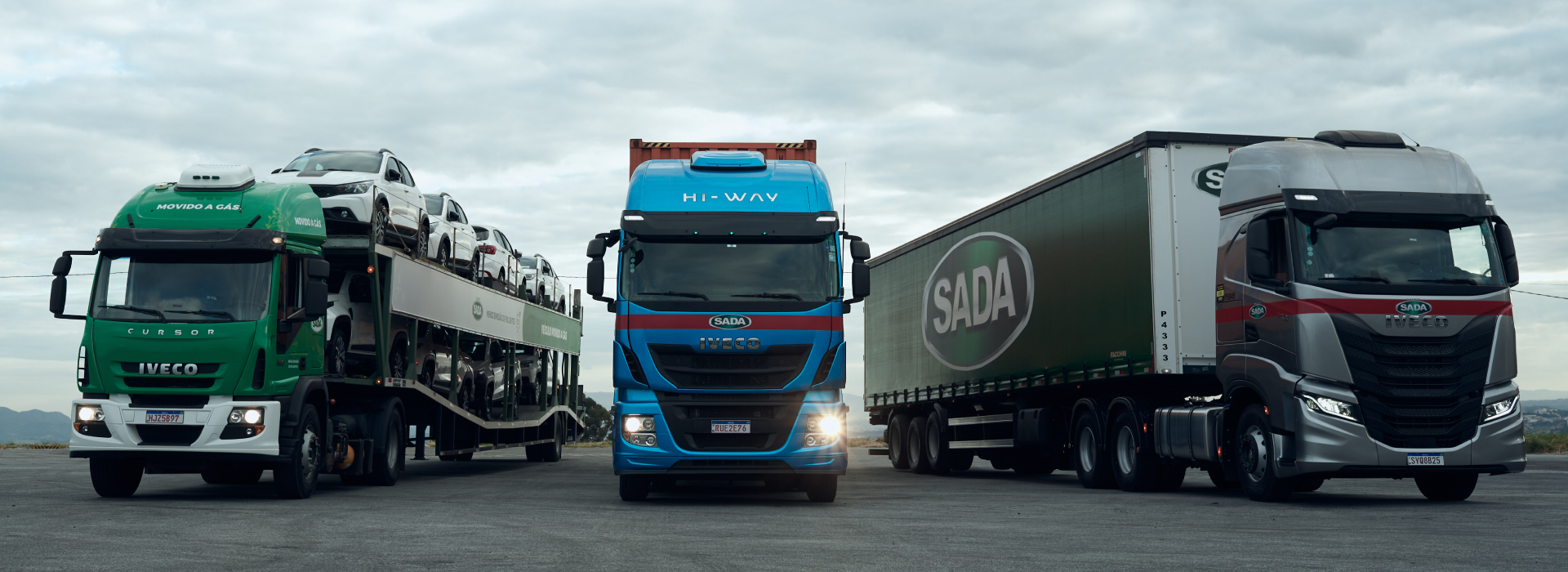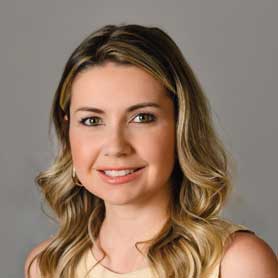Daniela Medioli: balancing legacy and innovation in cultural transformation
Driven by a quest for greater efficiency and a sharp focus on transforming organizational culture, Daniela serves as the Vice-president of Grupo SADA, overseeing various strategic areas and supporting over 30 companies within the Group.


Daniela Medioli
Vice-president of the SADA Group
Q.
Tell us about your professional journey in leadership roles and what shaped your career trajectory.
I have a degree in Social Sciences, with postgraduate studies and courses in the business area. I started working at Grupo SADA in 2011 and assumed a leadership position in 2016, after working in several areas such as controlling and strategic projects. In 2015, I led the creation of a shared services center (SSC), which resulted in the structuring of corporate areas. This project gave me greater legitimacy as a shareholder and leader.
I have always sought to transform the organizational culture, mainly in the sense of professionalizing the group's management and improving efficiency. My work focused on consolidating structures and implementing innovations, ensuring the growth and transformation of the management model. After consolidating the corporate areas, I moved to the transportation and logistics area, where I was Vice-president and worked on the cultural and technological transformation of the vertical.
I am currently preparing for a possible role as successor to the group's presidency. This year, I returned to the corporate areas, assuming responsibilities for several strategic areas, such as legal, finance, people management, technology, governance, sustainability and works, meeting the most of 30 companies of the SADA Group.
“We seek to create spaces where people feel free to make mistakes. Because if there is no freedom to make mistakes, there is no room for innovation.”
– Daniela Medioli, Vice-president of the SADA Group
Q.
How has your leadership style evolved? How do you promote evolution for your leadership team?
In today’s business environment, it is impossible to settle for just any position, as the environment is constantly changing, due to technological changes or new business models. Therefore, it is essential to create an environment conducive to innovation, with a strong focus on human capital, as the complexity of the challenges is always increasing. The stability of SADA’s teams and leaders over 40 years was largely a result of the context of the time. Today, we face a new scenario, with restless young people entering the job market, ready to face challenges in a world that is changing at an unprecedented speed.
As I mentioned before, the group adopted a model that was more focused on command and control. However, I value much more an environment of respectful exchange, shared solutions, clear goals and a strong culture of results. We invest in a solid integrity program, promote diversity and seek to create spaces where people feel free to make mistakes. Because if there is no freedom to make mistakes, there is no room for innovation.
Because we are a family-owned group, we are able to act more quickly in many aspects. We value agile governance, proactive leaders, and environments of constant exchange, with well-established rituals. Many of the solutions we develop arise from multiple perspectives — technology, engineering, productivity, quality, and finance. The more points of view we bring to the table, the better our solutions are. We also value leaders who have a holistic and open vision, because with the various business verticals we have, it is necessary for the leader to enjoy diverse, challenging, and, at the same time, stimulating environments. Another important aspect is intergenerational coexistence. We believe in providing space and opportunities for internal professionals, investing in training, and also bringing talent from the market to renew and strengthen our business.
Q.
Based on your own experience, what are the main critical success factors for a cultural ransformation journey in the company?
Cultural change is a gradual process. You can't expect to transform a culture overnight, or even in a year or two. The most profound and lasting transformations take at least five years. SADA, with its 48 years of history, is experiencing a important structural transition.
At times, I tried to speed up this process, but I soon realized that it was not working. I understood that it is more effective to move forward with slow but solid steps than to try to impose a transformation at any cost, with punitive measures and courteous.
I firmly believe in a cultural transformation based on values. It is essential to know where you want to go, clearly define what you want to be, and respect the organization's pace along the way. This includes leaders, who have their own time to adapt and develop the skills needed to keep up with the changes. It is a continuous process of evolution, always seeking improvements to achieve the goals.
“I firmly believe in a cultural transformation based on values.”
– Daniela Medioli, Vice-president of the SADA Group
or me, the most powerful tool for transformation is: example. Leaders who lead by example are crucial not only for transforming a company but also for making a positive impact on society. Investing in the development of a leadership culture, enhancing their skills, and aligning them with organizational values is vital to this process.
With the implementation of dss+, for example, we are working to create a culture of safe operations. Before, our priority was to serve the customer at any cost; now, we seek to do well, more and better, but without compromising the health and safety of our employees.
We have even learned to say "no" to the client when the conditions are not favorable, emphasizing that we will not accept compromising our values and principles. This is a real change of culture.
I have always been concerned with respecting the company's reality and proposing viable and applicable solutions. In short, to really make a difference, you need to have a clear definition of your values, understand where you want to go, respect the company's pace and value a solid transformation, even if it is slower.
Q.
What factors do you consider when hiring external consultancy to support you on this journey of cultural transformation?
The first thing we consider when hiring a consultancy is to have a clear understanding of our tangible objective, and that after we have exhausted our internal possibilities and skills, we need help. When choosing a consultancy, it is very important to have a reference, to look for a consultancy that has projects and positive stories with companies that we work with and admire. Also, to be in tune with the company, because there are highly renowned consultancies in the market, but they do not fit in with our culture. We need to have a consultancy that captures our essence, that does not come with a readymade solution off the shelf. Projects must have a practical side, so as not to remain just on paper; it is necessary to identify what will be reflected in practice and what will generate value.
With dss+, our primary objective was to enhance the safety culture within our organization, fostering a mindset of safe operations among both our leaders and employees. Additionally, although not our ultimate aim, we anticipated that this journey could also lead to improvements in operational productivity, as we have observed similar outcomes in other companies where dss+ has been involved.
“When choosing a consultancy, it is very important to have a reference, to look for a consultancy that has in its portfolio projects and positive stories with companies that we work with and admire.”
– Daniela Medioli, Vice-president of the SADA Group
Another point when choosing a consultancy is to look for a consultancy that has a tooling method and that leaves this tooling within the company. It is necessary for it to be a consultancy that acts as a partner, that wants to contribute to the generation of value and also, consolidate your brand and reputation in the market, as processes well executed feed new projects. I really believe in the partnership between dss+ and Grupo SADA, we see a lot of value and it has been a successful partnership. Our evolution is clear, and dss+ is a consultancy that delivers many of the values I mentioned, which is to train the internal team, give tools, have good references, have a reputation and be direct and sincere.
“I have a special affection for a project that has become an area: social responsibility and sustainability.”
– Daniela Medioli, Vice-president of the SADA Group
Q.
This series is about leaders who make a difference. What initiative or action have you taken in your career that made a difference and that you are most proud of?
I am very proud of the creation of the corporate areas, a model in which I have always believed. This model has raised our level of maturity and allowed significant advances in several areas. Today, the group is widely recognized, especially in Minas Gerais, as an excellent company to work for. In areas such as People and Technology, for example, we have won awards and recognition in the market, in addition to positive feedback from our customers and a proactive approach to deliveries. These results are a reflection of our commitment to valuing the human aspect, in a context where retaining talent becomes increasingly more challenging.
I cannot fail to highlight the synergy generated in the operational areas of transport and logistics, in addition to the leadership succession process, which brought great value both internally and for our customers.
The change in the management model, with the introduction of regional offices and management that supervise several bases, was a successful effort that brought positive results.
I have a special affection for a project that has become an area: social responsibility and sustainability. The SADA Group has always had a strong social role, which has always been part of our DNA. However, the actions were dispersed, without a clear identity. A few years ago, with the support of internal talents, we formalized this area, and today we have an award-winning team, with projects volunteering and a series of initiatives impactful. I am very proud of the leaders who consolidated and led these projects. Today, we have an exceptional team that makes all of this possible.